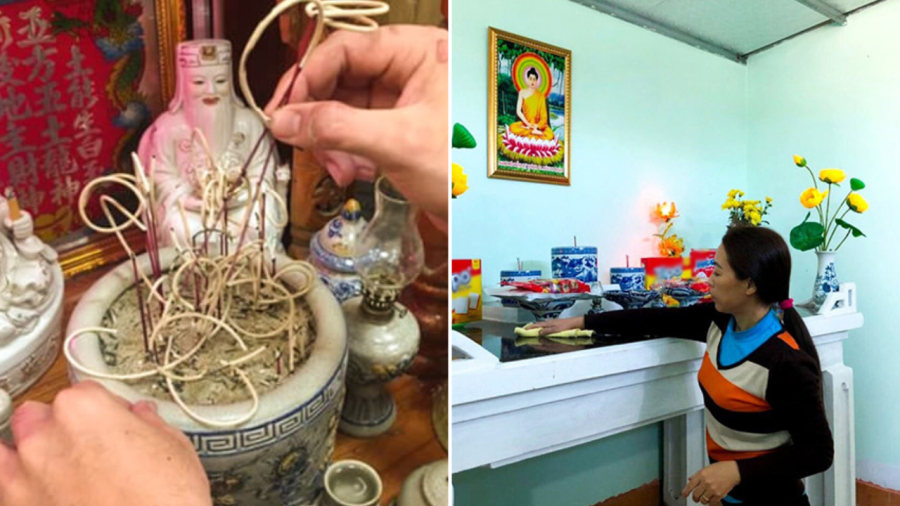Why you should not clean the altar with used water?
At the end of the year, families prepare to clean their altars and trim incense sticks for the Lunar New Year. When cleaning the altar, many people use used water. However, according to feng shui experts, if the homeowner wants to receive blessings, prosperity, and peace from their ancestors, they should not use used water but instead use other types of water, including five-flavor scented water.
It is believed that using used water to clean the altar is not strong enough to cleanse negative energy and does not fully demonstrate the sincere intentions of the homeowner.
Especially, if unclean water is used to clean the altar, it shows disrespect and can affect the purity and prosperity of the worship area.
To clean the altar, homeowners should use five-flavor scented water.

What is five-flavor scented water?
Five-flavor scented water is water boiled from five types of ingredients including cinnamon, star anise, cloves, cardamom, and agarwood. If these five ingredients are not available, homeowners can use substitute materials such as grapefruit leaves, betel leaves, lemongrass, glutinous rice leaves, dried cinnamon, lotus leaves… Depending on specific purchases and conditions, homeowners can choose suitable materials. These ingredients will be put into a pot, boiled to extract water, and allowed to cool slowly. When the water is still warm, it can be used to clean the altar.
These herbal ingredients are believed to have the ability to remove negative energy, evil spirits, and bad luck from the family. The natural aroma of these ingredients also helps repel insects, prevent mold, and bring a pleasant and refreshing aroma to the worship area.
If unable to prepare five-flavor scented water, homeowners can use warm water as a substitute. Although this type of water is simple, it still has the effect of removing dust and negative energy from the altar.
Notes when cleaning the altar
Before starting to clean the altar, homeowners need to clean themselves, wear proper clothes, and light incense to ask for permission from the deities and ancestors.
When cleaning the altar, wipe from top to bottom. Use a clean cloth to wipe. When cleaning the statues, use a soft cloth to avoid scratching or discolouring the paint. When cleaning the incense bowl, be extremely careful not to disturb it. In case of accidentally moving it, it should be lit again and then moved back to its original position.
When removing incense sticks, homeowners should remove them bit by bit, not all at once. Leave an odd number of incense sticks (3, 5, 7, 9…) in the incense bowl. The removed incense sticks can be converted into ashes and buried at the base of a tree.
This information is for reference and personal experience only.
How to Grow and Care for Gold and Silver Plants at Home: Meaning and Images
Discover the mystical power of gold and silver trees and their unique significance in feng shui. Learn how to plant and care for these special plants in order to bring luck and prosperity into your life.
2023 Lunar New Year Gift Ideas for Older Family and Friends
As 2021 approaches, families worldwide are gathering to celebrate the special bond between grandparents and their grandchildren. To show their love and admiration, these thoughtfully chosen gifts will bring a smile to the face of the elderly. Here, we have compiled a list of the 13 most meaningful Tet presents that can bring joy to our beloved grandparents.





































